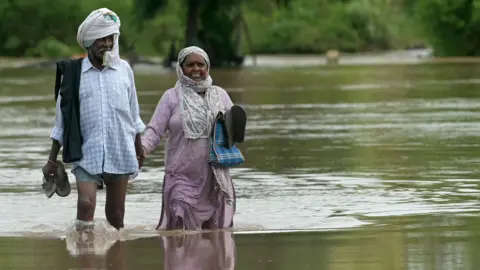The recent outbreak of wildfires in Canada has led to widespread air quality alerts across Canada and parts of the northern United States, with health advisories urging residents to minimize outdoor activities. Environment Canada has issued warnings for much of Ontario, stating that wildfire smoke has severely impacted air quality. On Monday, Toronto’s air pollution levels ranked among the most hazardous globally.
In the United States, air quality alerts have been prompted in cities like Chicago, where local health officials are advising precautions for sensitive groups, including infants and the elderly. Prime Minister Mark Carney is scheduled to meet with emergency response teams in Ottawa as fires blaze in Manitoba, Saskatchewan, and northern Ontario, displacing thousands of residents from their homes.
"Everyone should limit time outdoors when air pollution is elevated," cautioned Environment Canada in its advisory for Toronto. The guidance highlights the added risks for vulnerable populations, urging individuals to consider rescheduling or reducing outdoor events.
In a transnational exchange, six members of the US Congress recently expressed their concerns to the Canadian ambassador about the smoke from Canada complicating summer activities for Americans. In retaliation, the Premier of Manitoba criticized these lawmakers for "trivializing" the serious implications of wildfires.
The current wildfires are part of an alarming trend, with May and June being particularly challenging in western Canada. Nearly 30,000 individuals were compelled to evacuate in provinces like Saskatchewan and Manitoba, both of which have declared states of emergency.
Meanwhile, in eastern Canada, a new fire on the Bonavista peninsula in Newfoundland expanded rapidly, damaging several cabins. Experts attribute the increase in wildfire incidents to climate change, revealing that Canada is warming at twice the rate of the global average—its Arctic regions nearly three times faster.
In the United States, air quality alerts have been prompted in cities like Chicago, where local health officials are advising precautions for sensitive groups, including infants and the elderly. Prime Minister Mark Carney is scheduled to meet with emergency response teams in Ottawa as fires blaze in Manitoba, Saskatchewan, and northern Ontario, displacing thousands of residents from their homes.
"Everyone should limit time outdoors when air pollution is elevated," cautioned Environment Canada in its advisory for Toronto. The guidance highlights the added risks for vulnerable populations, urging individuals to consider rescheduling or reducing outdoor events.
In a transnational exchange, six members of the US Congress recently expressed their concerns to the Canadian ambassador about the smoke from Canada complicating summer activities for Americans. In retaliation, the Premier of Manitoba criticized these lawmakers for "trivializing" the serious implications of wildfires.
The current wildfires are part of an alarming trend, with May and June being particularly challenging in western Canada. Nearly 30,000 individuals were compelled to evacuate in provinces like Saskatchewan and Manitoba, both of which have declared states of emergency.
Meanwhile, in eastern Canada, a new fire on the Bonavista peninsula in Newfoundland expanded rapidly, damaging several cabins. Experts attribute the increase in wildfire incidents to climate change, revealing that Canada is warming at twice the rate of the global average—its Arctic regions nearly three times faster.

















